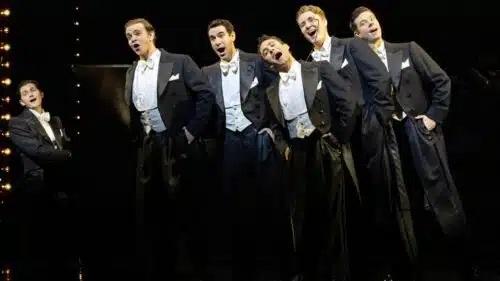NEW YORK—All decisions have consequences, yet the full effects of such choices are not always apparent until too late. “Harmony,” a long-gestating musical which recently arrived on Broadway, features music by Barry Manilow and book and lyrics by Bruce Sussman. The work shines a light on a now forgotten, but once world-famous singing group.
In 1927, Germany is reeling from the aftereffects of the first world war. Numerous political factions are vying for power, the streets are filled with protesters, and inflation is so high that a wheelbarrow of money gets you a slice of cheese. In the midst of all this, a newspaper advertisement brings together six men to form a musical group: Harry (Zal Owen), founder of the group; Lesh (Steven Telsey), a waiter from Bulgaria; Erich (Eric Peters), a medical student who can’t stand the sight of blood; Chopin (Blake Roman), a piano player/composer who works in a bordello; Bobby (Sean Bell), a rather intense bass-baritone; and Young Rabbi (Danny Kornfeld), son of a cantor, and originally from Poland. Chip Zien plays Rabbi as an older man, and also serves as the narrator of the show.





